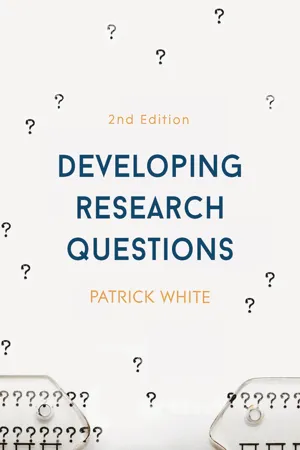Developing Research Questions
About this book
This no fuss, compact guide steers social science students of all levels through the complex process of conducting a research project. It explains how to break down initial ideas and broad topics into manageable questions and gives detailed guidance on how to refine these as the project progresses. With a wide range of international examples and reflective exercises, it is packed with handy tips and examples that show how to avoid common mistakes and pitfalls, and ensure that hypotheses and questions are linked with research design, methods and answers at every step. Taking readers from the start through to the final stage of answering their questions and drawing conclusions, this is an indispensable resource for research methods courses. In addition, it is highly recommended for all students undertaking an independent research project or thesis at undergraduate, postgraduate or PhD level and beyond. New to this Edition:
- Includes a wider range of international examples to appeal to a global audience
- More visual devices are used to summarise and illustrate the processes involved in developing research questions
- Reflective exercises help students apply their knowledge and consider the issues
- Increased coverage of the role of the literature review in generating and refining research questions
Tools to learn more effectively

Saving Books

Keyword Search

Annotating Text

Listen to it instead
Information
Table of contents
- Cover
- Contents
- List of Figures and Tables
- Acknowledgements
- 1 Where Do Research Questions Come From?
- 2 What Makes a Research Question?
- 3 What Makes a Question ‘Researchable’?
- 4 How Do My Research Questions Help Me Design My Study?
- 5 How Do I Answer My Research Questions?
- Glossary
- Bibliography
- Index
Frequently asked questions
- Essential is ideal for learners and professionals who enjoy exploring a wide range of subjects. Access the Essential Library with 800,000+ trusted titles and best-sellers across business, personal growth, and the humanities. Includes unlimited reading time and Standard Read Aloud voice.
- Complete: Perfect for advanced learners and researchers needing full, unrestricted access. Unlock 1.4M+ books across hundreds of subjects, including academic and specialized titles. The Complete Plan also includes advanced features like Premium Read Aloud and Research Assistant.
Please note we cannot support devices running on iOS 13 and Android 7 or earlier. Learn more about using the app
